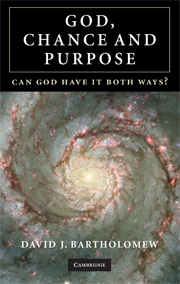Book contents
- Frontmatter
- Contents
- List of figures
- Preface
- 1 What is the problem?
- 2 What is chance?
- 3 Order out of chaos
- 4 Chaos out of order
- 5 What is probability?
- 6 What can very small probabilities tell us?
- 7 Can Intelligent Design be established scientifically?
- 8 Statistical laws
- 9 God's action in the quantum world
- 10 The human use of chance
- 11 God's chance
- 12 The challenge to chance
- 13 Choice and chance
- 14 God and risk
- References
- Further reading
- Index
9 - God's action in the quantum world
Published online by Cambridge University Press: 05 June 2012
- Frontmatter
- Contents
- List of figures
- Preface
- 1 What is the problem?
- 2 What is chance?
- 3 Order out of chaos
- 4 Chaos out of order
- 5 What is probability?
- 6 What can very small probabilities tell us?
- 7 Can Intelligent Design be established scientifically?
- 8 Statistical laws
- 9 God's action in the quantum world
- 10 The human use of chance
- 11 God's chance
- 12 The challenge to chance
- 13 Choice and chance
- 14 God and risk
- References
- Further reading
- Index
Summary
Quantum theory provides the most fundamental account of the physical world and it is at that level, one might suppose, that the roots of God's action would be found. The fact that the theory is probabilistic leads to the hope that the uncertainties present will provide enough room for God to manoeuvre. The conclusion of this chapter is that this hope is too optimistic for very much the same reasons as those used in the simpler cases treated in chapter 8. It is argued that the transition from the superimposed states of the theory to the single observed states is most naturally explained by expressing the problem in terms of conditional probabilities.
A STATISTICAL APPROACH
How God acts in the world, I repeat, has become one of the most discussed questions in the science and religion field – and beyond. As yet, there is no satisfactory answer to that question. This conclusion has been illustrated in the last chapter, on the small scale and on a restricted front. Now we view the problem on a larger canvas to see how the conclusions reached there survive when they are translated to global, or even, cosmic dimensions. If we find that the conclusions of the last chapter carry over, there is little more to be said. However, the transition from the simple and idealised world of the last chapter is not automatic, because it is not clear whether the quantum world is probabilistic in the way that I have been supposing hitherto.
- Type
- Chapter
- Information
- God, Chance and PurposeCan God Have It Both Ways?, pp. 136 - 155Publisher: Cambridge University PressPrint publication year: 2008



